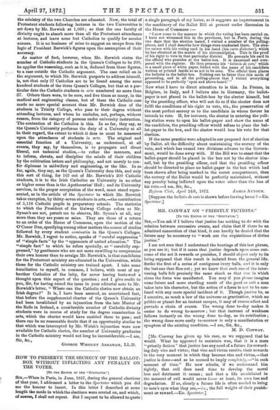MR. CONWAY ON "PRIESTLY FICTIONS."
[TO THE EDITOR OF THE "SPECTATOR.")
SIR,—You ask if I believe that justice has nothing to do with the relation between successive events, and claim that if there be an admitted connection of that kind, it can hardly be denied that the future may be necessary to "work out the requisitions of divine justice."
I am not sure that I understand the bearings of this last phrase, as you use it; but if it mean that justice depends upon some out- come of the act it rewards or punishes, I should object only to its being supposed that this result is isolated from the general life. Strike the first of a series of contiguous ivory balls, and it is only the last one that flies out ; yet we know that each one of the inter- vening balls felt precisely the same shock as that one in which alone the force was manifested. You may if you please imagine some future and more startling result of the good or evil a man takes into his character, but the action of a force is not to be con- fused with any mere special incident of it. Though justice be, as I conceive, as much a law of the universe as gravitation, which no pebble or planet for an instant escapes, it may of course affect and pervade a chain of events. The wrong done to-day makes it easier to do wrong to-morrow ; but that increase of weakness follows instantly on the wrong done to-day, as its retribution ; the wrong done more easily to-morrow is only a manifestation or symptom of the existing condition. —I am,-Sir, &a.,
M. D. CONWAY.
[Mr. Conway has given up his case, as we supposed that he would. What he appeared to maintain was, that it is a mere "priestly fiction" that justice has any need of a future for reward- ing duly vice and virtue, that vice and virtue receive their rewards in the very moment in which they become vice and virtue,—that justice is done—and as he seemed to imply completely,—" in each moment of time." He now admits, if we understand him rightly, that evil does need time to develop the moral loss and detriment it causes ; and that a life annihilated in the moment of evil would never know at least, its own loss and degradation. If so, clearly a future life is often needed to bring to men's eyes what they are,—i.e., the fall weight of their punish- ment or reward.—ED. Spectator.]


































 Previous page
Previous page